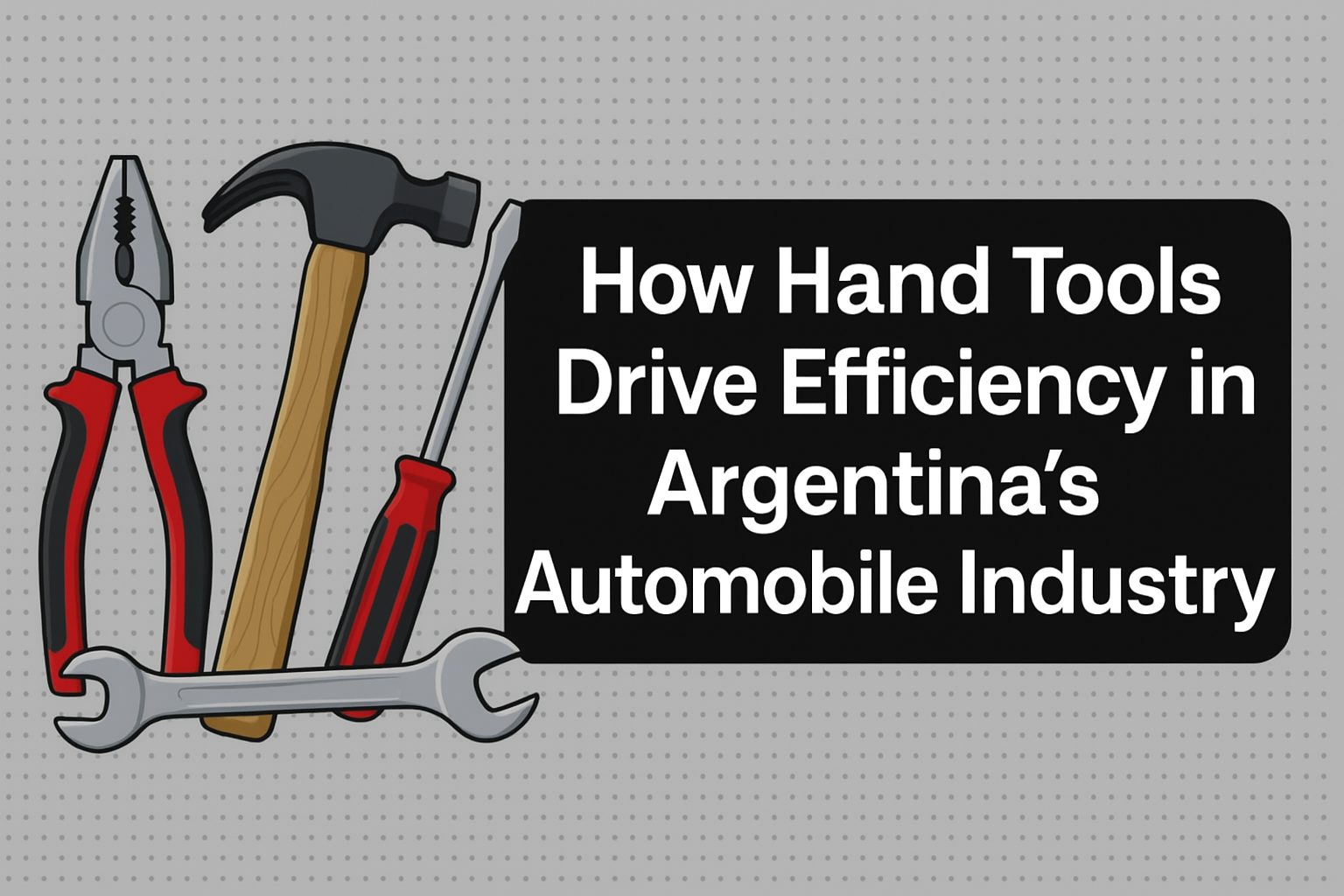
The automotive industry in Argentina stands as one of the most powerful engines of the nation’s economy. Beyond supplying vehicles for the domestic market, it also contributes significantly to exports, making it a critical pillar of South America’s trade landscape. From sprawling assembly plants in Córdoba and Buenos Aires to small family-run repair workshops in urban neighborhoods, this ecosystem thrives on three things: precision, reliability, and speed.
While modern factories are increasingly equipped with robotics and computer-controlled systems, there is an unsung hero that rarely gets enough attention—hand tools. Spanners, pliers, hammers, screwdrivers, socket sets, and measuring gauges may look simple, but they are the backbone of automotive productivity. Without them, neither multinational manufacturers nor small garage owners could maintain the efficiency required in today’s competitive auto sector.
This article takes a deep dive into the role of hand tools in Argentina’s automobile industry. It examines why they matter, the tools most commonly used, their impact on efficiency, safety, and economics, as well as the challenges and future outlook. It also highlights opportunities for hand tool manufacturers, exporters, suppliers, and wholesalers in Argentina and beyond.
Argentina’s Automobile Sector: A Snapshot
Argentina has long been recognized as a regional powerhouse in vehicle production. Some of the largest global automakers—including Toyota, Volkswagen, Ford, Renault, and General Motors—operate major production facilities in the country. Annual vehicle output often reaches hundreds of thousands of units, a significant share of which is exported to neighboring markets such as Brazil, Chile, and Uruguay.
The sector is also a major source of employment, supporting over 500,000 direct and indirect jobs. Its supply chain is vast, stretching from large OEMs to spare part suppliers, mechanics, logistics providers, and accessory manufacturers. To understand the role of hand tools, it’s necessary to look at each level of this ecosystem:
- OEM Manufacturing Plants – Precision tools are critical for mass assembly.
- Spare Part Suppliers – Depend on accurate hand tools for inspection, assembly, and packaging.
- Local Repair Workshops – From oil changes to complete engine rebuilds, they rely on toolkits.
Despite automation, hand tools remain essential. Robots excel at repetitive assembly, but they lack the adaptability and finesse of a mechanic with a wrench or plier in hand.
Why Hand Tools Are Critical to Efficiency
1. Precision in Complex Repairs
Modern vehicles blend mechanical systems with electronics. Repairs often take place in tight spaces or involve fragile components. Tools like torque wrenches allow mechanics to apply exact force, ensuring safety and precision without damaging parts.
2. Speed in Maintenance Services
Car owners in cities such as Buenos Aires or Rosario demand quick service. A garage equipped with well-organized ratchets, spanners, and pliers can complete jobs much faster. Even shaving off 10 minutes per repair adds up to several extra customers per day—boosting revenue.
3. Cost Efficiency for Small Businesses
Independent garages cannot always afford advanced power tools or diagnostic systems. For them, a set of durable spanners or sockets is a long-term investment. This affordability empowers Argentina’s many small mechanics to thrive.
4. Portability in Roadside Assistance
Argentina’s long rural highways often witness breakdowns. Roadside mechanics typically carry only a toolbox. Hand tools ensure mobility, enabling them to fix issues on the spot—something bulky machines cannot achieve.
Core Hand Tools in Argentina’s Auto Industry
Across plants, suppliers, and workshops, certain tools form the foundation of productivity:
- Wrenches & Spanners – Adjustable, combination, and torque wrenches are indispensable.
- Screwdrivers – Flat, Phillips, and Torx for electrical, dashboard, and bodywork.
- Pliers – Needle-nose for wiring, slip-joint for clutches and brakes.
- Hammers & Mallets – Used in dent repairs, suspensions, and loosening tight parts.
- Socket Sets & Ratchets – Essential for repetitive tightening and loosening.
- Measuring Tools – Calipers, gauges, and tape measures ensure assembly accuracy.
In Argentina, mechanics call these their “weapons of trade.” A missing tool means wasted time and lost customer trust.
The Role of Hand Tools in Large Manufacturing Plants
At Toyota’s Zárate facility or Volkswagen’s General Pacheco plant, robotics dominate. However, hand tools still play a decisive role:
- Final Adjustments – Torque wrenches ensure bolts are fastened to exact specifications.
- Quality Control – Calipers and gauges confirm that tolerances meet industry standards.
- Customization – Special-market modifications require manual work.
The partnership between automation and manual precision keeps Argentina’s auto industry globally competitive.
Workshops: The Frontline for Hand Tools
Argentina’s independent workshops and service stations are heavily tool-dependent:
- Repair Garages – Handle engines, brakes, and exhausts with sockets, spanners, and gauges.
- Customization Shops – Add aftermarket exhausts, lights, or body kits using pliers and files.
- Service Stations – Oil changes, tire rotations, and quick fixes demand reliable toolkits.
For small and medium-sized businesses, tool quality is directly linked to efficiency. Poor-quality or counterfeit tools delay work, damage parts, and reduce profitability.
Economic Value of Hand Tools in the Auto Sector
Hand tools directly and indirectly support Argentina’s economic output:
- OEM Plants – Every minute of downtime costs thousands of dollars. Reliable tools minimize interruptions.
- Workshops – Increased service capacity translates to higher income.
- Export Logistics – Efficient repairs ensure vehicles meet export deadlines.
This makes hand tools an economic enabler, driving both domestic production and international trade.
Hand Tools and Workplace Safety
Quality hand tools are also tied to safety, both for mechanics and consumers:
- Ergonomic Handles reduce fatigue and strain during long hours.
- Insulated Tools protect technicians when working on hybrid or EV wiring.
- Torque Control prevents dangerous over-tightening that could cause failures.
By reducing accidents, rework, and liability claims, high-quality tools enhance safety while boosting efficiency.
Opportunities for Hand Tool Manufacturers, Exporters, Suppliers, and Wholesalers
Argentina’s automobile sector presents vast opportunities for the global hand tool manufacturer community as well as exporters, suppliers, and wholesalers.
- Local Demand – Independent mechanics need cost-effective yet durable tools.
- OEM Partnerships – Automakers prefer suppliers that can provide consistent quality.
- Export Channels – With Argentina’s strong trade with Brazil, Chile, and Uruguay, global tool exporters can benefit from increased demand.
- Wholesale Markets – Distributors and wholesalers who offer bulk solutions gain strong footholds in service networks.
The synergy between local demand and international supply chains makes Argentina a promising market for hand tool exporters and suppliers looking to expand their reach.
Current Challenges in Argentina’s Hand Tool Market
Despite their importance, several issues challenge tool adoption:
- Counterfeit Tools – Fake products compromise safety and efficiency.
- Import Dependency – Many high-quality tools are imported, leading to price fluctuations.
- Skill Gaps – Mechanics lacking training in advanced tools cannot maximize productivity.
Solutions include fostering local hand tool manufacturing, building partnerships with global exporters, and strengthening quality standards.
Future Outlook: Hand Tools in a Changing Auto Landscape
Looking ahead, Argentina’s automobile sector will transform with global trends, and hand tools will evolve alongside it:
- Electric Vehicles (EVs) – Demand for insulated, specialized tools will rise.
- Smart Tools – Digital torque wrenches and electronic gauges are gaining traction.
- Local Manufacturing Growth – Building domestic capacity can reduce import dependency and create jobs.
- Sustainability – Eco-friendly production by tool manufacturers may become a competitive advantage.
Workshops and plants that adapt to these changes will not only meet domestic needs but also strengthen Argentina’s role in the global automotive value chain.
Conclusion
From sprawling assembly plants in Córdoba to roadside repair shops in Patagonia, hand tools remain the quiet backbone of Argentina’s automotive industry. They bring precision, speed, cost-efficiency, and safety across every level of the ecosystem.
Robots and advanced machinery may dominate headlines, but the humble wrench, plier, or screwdriver continues to define daily productivity. As the industry shifts toward electric vehicles, automation, and sustainability, the demand for reliable tools will only grow.
For hand tool manufacturers, exporters, suppliers, and wholesalers, Argentina represents not just a market but a long-term growth opportunity. Hand tools are more than instruments—they are enablers of efficiency, protectors of safety, and partners in progress.
In Argentina’s auto industry, the road to innovation and efficiency will always be paved with the steady grip of a trusted hand tool.























